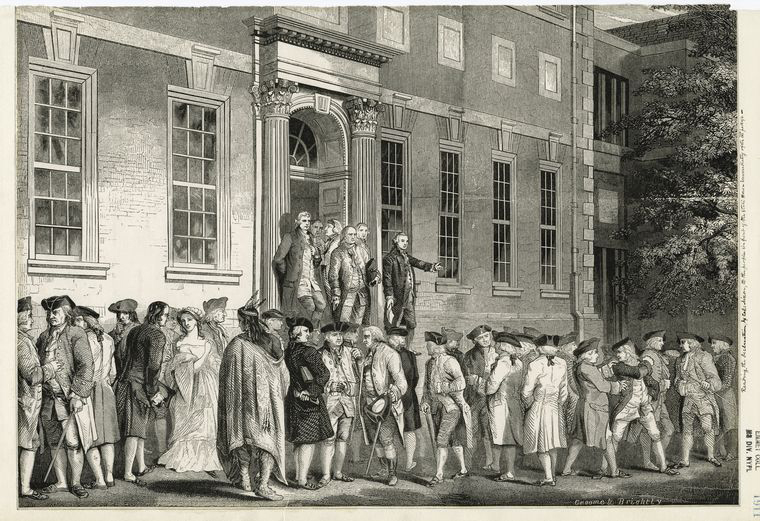The requisite number of town hall meetings across New Hampshire ratify the State’s second Constitution. This one has a declaration of rights, Articles 1, 2, 5, 6, 8, 10, 13, 15, 16, 17, 18, 19, 20, 22, 23, 25, 27, 30, 31, 32, 33 and 37of which state:
- “All men are born equally free and independent; Therefore, all government of right originates from the people. …
- “All men have certain natural, essential, and inherent rights among which are, the enjoying and defending life and liberty; acquiring, possessing, and protecting, property; and, in a word, of seeking and obtaining happiness.
- “Every individual has a natural and unalienable right to worship God according to the dictates of his own conscience, and reason; and no subject shall be hurt, molested, or restrained, in his person, liberty, or estate, for worshipping God in the manner and season most agreeable to the dictates of his own conscience; or for his religious profession, sentiments, or persuasion; provided he doth not disturb the public peace or disturb others in their religious worship.
- “[N]o person shall ever be compelled to pay towards the support of the schools of any sect or denomination. And every person, denomination or sect shall be equally under the protection of the law; and no subordination of any one sect, denomination or persuasion to another shall ever be established.
- [T]he public’s right of access to governmental proceedings and records shall not be unreasonably restricted. The public also has a right to an orderly, lawful, and accountable government.
- “The doctrine of nonresistance against arbitrary power, and oppression, is absurd, slavish, and destructive of the good and happiness of mankind.
- “No person, who is conscientiously scrupulous about the lawfulness of bearing arms, shall be compelled thereto.
- “No subject shall be held to answer for any crime, or offense, until the same is fully and plainly, substantially and formally, described to him; or be compelled to accuse or furnish evidence against himself. … No subject shall be arrested, imprisoned, despoiled, or deprived of his property, immunities, or privileges, put out of the protection of the law, exiled or deprived of his life, liberty, or estate, but by the judgment of his peers, or the law of the land; provided that, in any proceeding to commit a person acquitted of a criminal charge by reason of insanity, due process shall require that clear and convincing evidence that the person is potentially dangerous to himself or to others and that the person suffers from a mental disorder must be established. Every person held to answer in any crime or offense punishable by deprivation of liberty shall have the right to counsel at the expense of the state if need is shown; this right he is at liberty to waive, but only after the matter has been thoroughly explained by the court.
- “No subject shall be liable to be tried, after an acquittal, for the same crime or offense. Nor shall the Legislature make any law that shall subject any person to a capital punishment, (excepting for the government of the army and navy, and the militia in actual service) without trial by jury.
- “In criminal prosecutions, the trial of facts, in the vicinity where they happened, is so essential to the security of the life, liberty and estate of the citizen, that no crime or offense ought to be tried in any other county or judicial district than that in which it is committed; except in any case in any particular county or judicial district, upon motion by the defendant, and after a finding by the court that a fair and impartial trial cannot be had where the offense may be committed, the court shall direct the trial to a county or judicial district in which a fair and impartial trial can be obtained.
- “All penalties ought to be proportioned to the nature of the offense. … The true design of all punishments being to reform, not to exterminate mankind.
- “Every subject hath a right to be secure from all unreasonable searches and seizures of his person, his houses, his papers, and all his possessions. Therefore, all warrants to search suspected places, or arrest a person for examination or trial in prosecutions for criminal matters, are contrary to this right, if the cause or foundation of them be not previously supported by oath or affirmation; and if the order, in a warrant to a civil officer, to make search in suspected places, or to arrest one or more suspected persons or to seize their property, be not accompanied with a special designation of the persons or objects of search, arrest, or seizure; and no warrant ought to be issued; but in cases and with the formalities, prescribed by law.
- “Free speech and Liberty of the press are essential to the security of Freedom in a State: They ought, therefore, to be inviolably preserved.
- “Retrospective [ex post facto] laws are highly injurious, oppressive, and unjust. No such laws, therefore, should be made, either for the decision of civil causes, or the punishment of offenses.
- “Standing armies are dangerous to liberty, and ought not to be raised, or kept up, without the consent of the Legislature.
- “No soldier in time of peace, shall be quartered in any house, without the consent of the owner; and in time of war, such quarters ought not to be made but by the civil authorities in a manner ordained by the Legislature.
- “The freedom of deliberation, speech, and debate, in either House of the Legislature, is so essential to the rights of the people, that it cannot be the foundation of any action, complaint, or prosecution, in any other Court or place whatsoever.
- “The Legislature shall assemble for the redress of public grievances and for making such laws as the public good may require.
- “The People have a right, in an orderly and peaceable manner, to assemble and consult upon the common good, give instructions to their Representatives, and to request of the legislative body, by way of petition or remonstrance, redress of the wrongs done them, and of the grievances they suffer.
- “No Magistrate, or Court of Law, shall demand excessive bail or sureties, impose excessive fines, or inflict cruel or unusual punishments.
- “In the government of this State, the three essential powers thereof, to wit, the Legislative, Executive, and Judicial, ought to be kept as separate from, and independent of, each other, as the nature of a free government will admit, or as is consistent with that chain of connection that binds the whole fabric of the Constitution in one indissoluble bond of union and amity.”
[restored 11/17/2024]
Subsequent Events:
Authority:
unanimous Declaration (of Independence), Paragraph 6
ccc-2point0.com/unanimous-Declaration
References:
James Bovard, “The Right of Resistance,” Ideas on Liberty, 50 (August 2000) 8:35.
State Constitution – Bill of Rights | NH.gov
www.nh.gov/glance/bill-of-rights.htm


